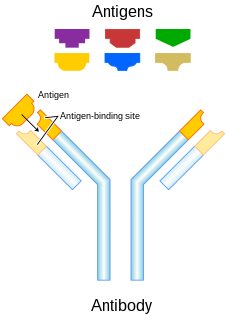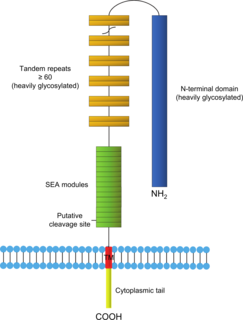
In immunology, an antigen (Ag) is a molecule or molecular structure, such as may be present on the outside of a pathogen, that can be bound by an antigen-specific antibody or B-cell antigen receptor. The presence of antigens in the body normally triggers an immune response. The Ag abbreviation stands for an antibody generator.
A cancer vaccine is a vaccine that either treats existing cancer or prevents development of cancer. Vaccines that treat existing cancer are known as therapeutic cancer vaccines. Some/many of the vaccines are "autologous", being prepared from samples taken from the patient, and are specific to that patient.

Immunohistochemistry (IHC) is the most common application of immunostaining. It involves the process of selectively identifying antigens (proteins) in cells of a tissue section by exploiting the principle of antibodies binding specifically to antigens in biological tissues. IHC takes its name from the roots "immuno", in reference to antibodies used in the procedure, and "histo", meaning tissue. Albert Coons conceptualized and first implemented the procedure in 1941.

CA-125 also known as mucin 16 or MUC16 is a protein that in humans is encoded by the MUC16 gene. MUC16 is a member of the mucin family glycoproteins. CA-125 has found application as a tumor marker or biomarker that may be elevated in the blood of some patients with specific types of cancers, or other conditions that are benign.

Mucins are a family of high molecular weight, heavily glycosylated proteins (glycoconjugates) produced by epithelial tissues in most animals. Mucins' key characteristic is their ability to form gels; therefore they are a key component in most gel-like secretions, serving functions from lubrication to cell signalling to forming chemical barriers. They often take an inhibitory role. Some mucins are associated with controlling mineralization, including nacre formation in mollusks, calcification in echinoderms and bone formation in vertebrates. They bind to pathogens as part of the immune system. Overexpression of the mucin proteins, especially MUC1, is associated with many types of cancer.
Matuzumab is a humanized monoclonal antibody for the treatment of cancer. It binds to the epidermal growth factor receptor (EGFR) with high affinity. The mouse monoclonal antibody (mAb425) from which matuzumab was developed at the Wistar Institute in Philadelphia, Pennsylvania

Mesothelin, also known as MSLN, is a protein that in humans is encoded by the MSLN gene.

Mucin 1, cell surface associated (MUC1), also called polymorphic epithelial mucin (PEM) or epithelial membrane antigen or EMA, is a mucin encoded by the MUC1 gene in humans. MUC1 is a glycoprotein with extensive O-linked glycosylation of its extracellular domain. Mucins line the apical surface of epithelial cells in the lungs, stomach, intestines, eyes and several other organs. Mucins protect the body from infection by pathogen binding to oligosaccharides in the extracellular domain, preventing the pathogen from reaching the cell surface. Overexpression of MUC1 is often associated with colon, breast, ovarian, lung and pancreatic cancers. Joyce Taylor-Papadimitriou identified and characterised the antigen during her work with breast and ovarian tumors.

Mucin 4 is a mucin protein that in humans is encoded by the MUC4 gene. Like other mucins, MUC-4 is a high-molecular weight glycoprotein.
A bispecific monoclonal antibody is an artificial protein that can simultaneously bind to two different types of antigen. BsMabs can be manufactured in several structural formats, and current applications have been explored for cancer immunotherapy and drug delivery.
According to the National Cancer Institute, a tumor antigen vaccine is a "vaccine made of cancer cells, parts of cancer cells, or pure tumor antigens ". A tumor antigen vaccine may stimulate the body's immune system to find and kill cancer cells. As such, tumor antigen vaccines are a type of cancer immunotherapy.
CA 15-3, for Carcinoma Antigen 15-3, is a tumor marker for many types of cancer, most notably breast cancer.
CA 27.29 is a tumor marker for breast cancer.

Veliparib (ABT-888) is a potential anti-cancer drug acting as a PARP inhibitor. It kills cancer cells by blocking a protein called PARP, thereby preventing the repair of DNA or genetic damage in cancer cells and possibly making them more susceptible to anticancer treatments. Veliparib may make whole brain radiation treatment work more effectively against brain metastases from NSCLC. It has been shown to potentiate the effects of many chemotherapeutics, and as such has been part of many combination clinical trials.
Onartuzumab is a humanized monoclonal antibody designed for the treatment of advanced non-small-cell lung cancer.
CVac, is an immunotherapeutic agent that was first developed in Australia.
Margetuximab, sold under the brand name Margenza, is a chimeric IgG monoclonal antibody medication against HER2 used for the treatment of cancer.
Transgene SA is a France-based fully integrated biopharmaceutical company specialising in immunotherapeutics to treat cancer and infectious diseases. The company has subsidiaries in China and in the USA. The company has been strongly supported by the Mérieux family since 1994. Transgene was listed on the Paris Stock Exchange in 1998.
SK-OV-3 is an ovarian cancer cell line derived from the ascites of a 64-year-old Caucasian female with an ovarian serous cystadenocarcinoma. The SK-OV-3 cell line is also hypodiploid, with a modal number of chromosomes of 43, occurring in 63.3% of cells. SK-OV-3 are positive for many of the antigens used to identify cancers of epithelial origin in clinical practice, including vimentin (VIM), high molecular weight cytokeratin (HMWK), low molecular weight cytokeratin (LMWK), epithelial membrane antigen (EMA) and leucocyte common antigen (LCA).







